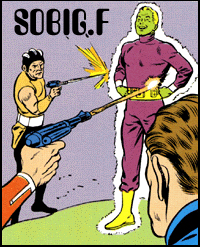
Search me how it's pronounced, but if you're in the market for an external drive enclosure that's worth every penny, this unit is "boffo":

I bought it last week to aid my company's data-server backup system; it's a loose father-son routine, with modified-file-transfer every night and a backup drive swap every Friday. For about a year, we've simply backed up to a internally mounted removable drive bay (we're a small company; we can get away with it). The only problem is that computer maintenance always comes down to myself, the bay is not hot-swappable (it can't be disconnected while computer is operational), and I've got early risers and late workers alongside me: I don't think we've ever removed the, er, removable drive bay. Given the nominal threat of electrical surges - connected UPS notwithstanding - and viral damage, keeping a data reserve in service at all times is not the safest thing to do.
That all changes with the Plug-and-Play, hot-swappable Bafo BF-2003. I simply attach the enclosure to an AC power supply and connect it to the server via USB 2.0. Recognition takes less than seven seconds; a taskbar icon pops up for monitoring, modifying and ultimately disconnecting my "removable hardware." Removing the drive from the system takes five clicks, including closing two windows - then I detach the USB cable and power coupling, and take the enclosure wherever I like. Swapping drives in and out of the enclosure requires a screwdriver (the metal kind, you know, this is pretty low-stress work) but takes less than two minutes after a little practice.
Want a smart, effective data backup? Buy drives in two, throw one of them into a hot-swappable enclosure like the Bafo. Even the Russian judge would give this hardware better than a 4.5.
FIVE MONTHS LATER: I'm still using two Bafo drives for the office. The unit's internal fan is problematic, however, and is better left disconnected than imitating the sound of a Dremel tool. What's more, Plug-and-Play installation can often be squirrelly, and the lack of an on/off switch doesn't help matters. A project has necessitated the purchase of two more enclosures, and I bought from a different company: Alpha Digital. Even though I have no reason to give up the Bafos, the new enclosures are head and shoulders above them.
Remember Gary Larson's The Far Side daily with the angry dog owner scolding his dog Ginger - the dog's translation of which was, of course, "Blah blah blah Ginger, blah blah blah blah Ginger"? Care of our inventive, Pacific brothers, you too can play Han Solo to your dog's Chewbacca:
With the US release of the Bow-Lingual, Japanese Toy manufacturer Takara Corporation tackles what we'd call the little known 'Dr. Dolittle Market' (i.e. the people who want to talk with the animals). The Bow-Lingual aims to translate "dog" into "English" - converting simple dog barks into phrases printed on the unit's small, portable LCD screen. It's ingenious, innovative, and interesting - but somewhat flawed.
Part of that flaw, explains the article, is that dogs aren't exactly enigmatic or worth $100 of United Nations-style translation. Read on.
Networking makes my head spin: so leave it to PC Magazine to compile the most informative and exciting look ahead to home and business power-networking in the future.
Fantastic reading. My head's going like a centrifuge.
A nerd is nabbed:
A teenager has been questioned about altering the MSBlast worm to make it more devasting, and an arrest is expected.A teenager suspected of making the devastating MSBlast Internet worm even more potent is expected to be arrested, the Seattle Times has reported, citing two US Justice Department sources.
Shy bookworms can be prevented from pupating into antisocial computer terrorists. Every single one of us knows or knows of someone lost to the easy domination of coded thuggery. This, ladies and gentlemen, this is why high schools hold Sadie Hawkins dances.
UPDATE: Wired published an article in 1999 on the work of Canadian psychologist Marc Rogers, underscoring the perceived hacker bell curve: "The most visible breed of computer cracker is an obsessive middle-class white male, between 12 and 28 years old, with few social skills and a possible history of physical and sexual abuse." Security systems expert Peter Shipley disagreed but, far from a psychologist, offered only a few anecdotes of hackers he's known. A body builder? Drop-dead gorgeous woman? It sounds like Shipley's jonesing for a hacker-infested, utterly bleak, futuristic, plutarchical police state. An interesting debate, in any case.
If you can't beat 'em, impugn 'em:
The controller of BBC1 launched an unprecedented attack on Rupert Murdoch yesterday, calling the media billionaire a "capital imperialist" who wants to destabilise the corporation because he "is against everything the BBC stands for".
Only partly true. Murdoch is against much of what the BBC stands for. He sells his news to viewers; the success of his media giant is directly dependent upon a British desire to read the Sun or watch Sky. The BBC enjoys a compulsory television tax. "Destabilization" is, of course, what's known in the private sector as "competition." Who are the imperialists, again?
At last count, heat deaths throughout France were at 3,000. Instapundit reports that the toll has climbed to 10,000. I compared them to Third World levels; considering the example in India I provided, where the press addressed a much smaller disaster with the same tone, France has likely broken records. Frightening.
The real news is that through a combination of poor execution by hackers and expert prevention by authorities, SoBig's latest epidemic will not cause damage and confusion as feared. Now, the prospect of intercontinental hackers with the world at their mercy isn't a concept foreign to the stuff of comic books - especially with the bizarrely extensive lengths to which the perpetrators have gone. The San Francisco Chronicle nevertheless serves us a report that rivals the best of sci-fi, megalomaniac, geostrategic villainy:
A powerful e-mail virus known as SoBig was thwarted Friday as it attempted to change itself, possibly into a more destructive force.
Remove "e-mail," "virus" and "Sobig." Insert, respectively, "radioactive," "lizard" and "Godzilla." What are we talking about, again?
A coordinated defense by commercial and government computer experts illustrates the growing arms race between Internet miscreants, and public and private authorities.
"Arms race"? Will this culminate in a hallmark treaty conference - perhaps a signing of the Network Effluvium Reduction Directive (NERD)?
For days, commercial antivirus wizards and Department of Homeland Security investigators had been working to stop the self-replicating virus, or worm, from infecting computers.
"Antivirus experts" doesn't do them justice, apparently - especially when they're wearing their conical, star-and-moon hats. (Another one.) The Chronicle is up against the weight of cultural assumptions, here: call someone a "wizard," and you'd better expect a certain mental picture.
At noon, all computers worldwide that were infected with SoBig -- more than 100,000, according to Santa Clara antivirus firm Network Associates -- were to make contact with these 20 computers, where experts believe the worm was evidently destined to download more instructions. What those instructions would be, no one knew.
Emphasis mine. Comic book font, plate echo and dissonant orchestral sforzando, stat!
The topic is, of course, serious; and to be fair, most of the article doesn't flirt with DC-Marvel-Kaiju. But once started, a theme needs a solid denouement; and what's SoBig-Con without its exemplar:
"If he's caught, everyone will probably be startled at how sweaty and dull he turns out to be," said George Smith, a senior fellow with Alexandria, Va., think tank GlobalSecurity.org.
Keep your children close, citizens! Every man with a pocket protector is a potential supervillain. We've yet to see the worst.

A SoBig infection in the office has been playing hide-and-seek with us for two days. I may have finally it pinned down, which means I can now turn my attention to a three-step hardware upgrade: the administrative assistant's hard drive went rock-tumbler yesterday; her drive's replacement coincides with an upgrade of our server backup system we've been wanting to implement; and amid the confusion I'll finally give myself a proper, single-partition drive.
Expect link-and-pith during the day while I'm waiting for installations and data transferrals.
Sometimes the right things go wrong:
The [Blaster virus] infection caused computers to reboot frequently or disrupted users' browsing on the internet. But it also packed a second punch.Computer experts said starting at 12:01 a.m. US time Saturday, infected computers that have not cleaned up the virus would in effect turn into a legion of zombies instructed to repeatedly call up a Microsoft website that houses the software patch. If enough traffic flooded the network, the site could be rendered unreachable and computer users would be unable to access the patch.
But the exploiters of the Microsoft flaw made a mistake themselves. The worm instructed computers to call up http://windowsupdate.com - which is an incorrect address for reaching the actual Microsoft website that houses the software patch. Although Microsoft has long redirected those who visited that incorrect address to the real site - http://windowsupdate.microsoft.com - the company disabled the automatic redirection last Thursday in preparation for the onslaught of infected computers.
Hear the hoofbeats of the Dumb Mistake Cavalry as it rides to the rescue? Remember, Glenn, tomorrow's cybersociopaths with error-extirpation subroutines buried in their skulls won't make these kinds of blunders (though I suppose you might argue that a copy editor would achieve the same thing). Still, caveat emptor, I say.
I'll write on the topic at relative length within the week, if all goes well.
I was walking down the hall, just about to open the restroom door when the lights wavered and dimmed, the elevators beeped madly and the air conditioning ground down to a halt. Emergency lights went on. I turned back to the office where we had a little laugh about building management.
Then the lights went off - and stayed off. People called around, a few family relations phoned the office, and we quickly had a picture of the entire Greater Cleveland area with its lights out.
We all left together. In the parking lot, radios came on. Much of the eastern United States had been affected. Frightening. Everyone wished the other good luck in their impending negotiation of improvised four-way stops and likely gridlock on the highway. I was lucky enough to be able to change my route to swing by the folks' for talk of the town over cold sandwiches (which reminds me, I'll need to canvas my refrigerator). There was absent-minded flicking of lights and corresponding laughter.
But for a brief instant when the office crew heard the news over the radio, no panic; the traffic shuffling through intersections was magnificently well-behaved with only about four-and-a-half bozos jumping someone's turn; my parents and I spent a grand total of ten minutes either talking about or listening to DJs talk about the blackout. Near D.C., my sister wasn't affected; she instructed my mother to send regular reports.
Back to the apartment. I took a hell of a colorful walk, then groped my way to bed with a flashlight.
Lights having come back up here and elsewhere, more than half of the country - those directly affected and everyone worrying about them - must be breathing a sigh of relief. Everyone except those with the cameras, microphones and penchants for journalism-award-winning chaos, that is.
